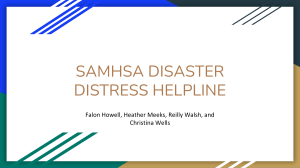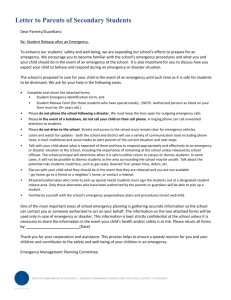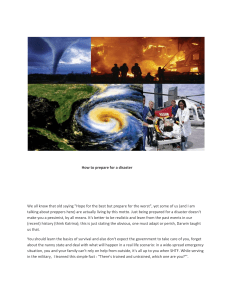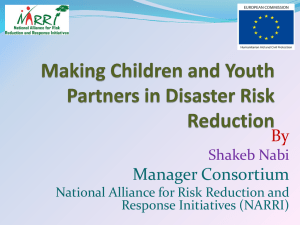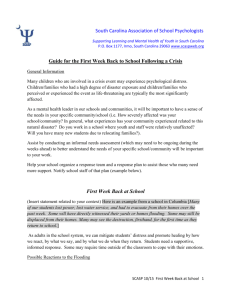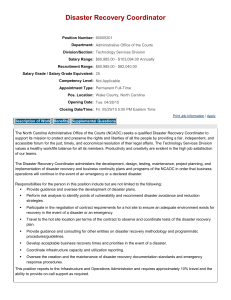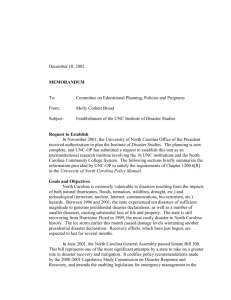SCASP Flood Resources
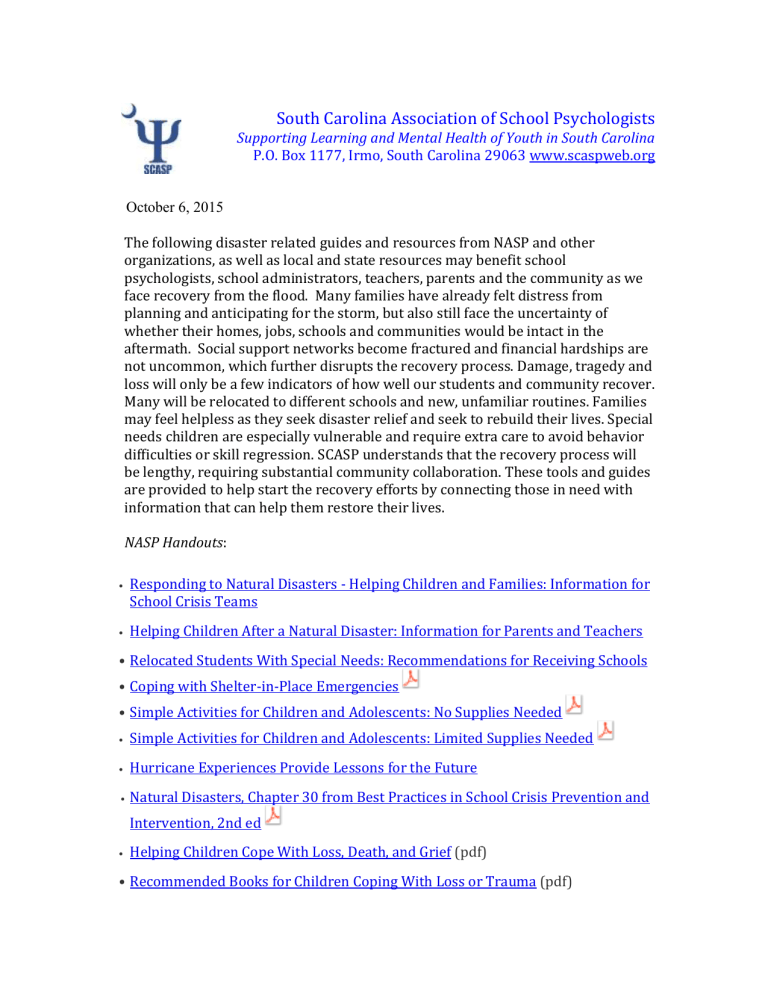
South Carolina Association of School Psychologists
Supporting Learning and Mental Health of Youth in South Carolina
P.O. Box 1177, Irmo, South Carolina 29063 www.scaspweb.org
October 6, 2015
The following disaster related guides and resources from NASP and other organizations, as well as local and state resources may benefit school psychologists, school administrators, teachers, parents and the community as we face recovery from the flood. Many families have already felt distress from planning and anticipating for the storm, but also still face the uncertainty of whether their homes, jobs, schools and communities would be intact in the aftermath. Social support networks become fractured and financial hardships are not uncommon, which further disrupts the recovery process. Damage, tragedy and loss will only be a few indicators of how well our students and community recover.
Many will be relocated to different schools and new, unfamiliar routines. Families may feel helpless as they seek disaster relief and seek to rebuild their lives. Special needs children are especially vulnerable and require extra care to avoid behavior difficulties or skill regression. SCASP understands that the recovery process will be lengthy, requiring substantial community collaboration. These tools and guides are provided to help start the recovery efforts by connecting those in need with information that can help them restore their lives.
•
•
NASP Handouts:
Responding to Natural Disasters - Helping Children and Families: Information for
School Crisis Teams
Helping Children After a Natural Disaster: Information for Parents and Teachers
• Relocated Students With Special Needs: Recommendations for Receiving Schools
• Coping with Shelter-in-Place Emergencies
• Simple Activities for Children and Adolescents: No Supplies Needed
•
•
Simple Activities for Children and Adolescents: Limited Supplies Needed
Hurricane Experiences Provide Lessons for the Future
•
Natural Disasters, Chapter 30 from Best Practices in School Crisis Prevention and
•
Intervention, 2nd ed
Helping Children Cope With Loss, Death, and Grief (pdf)
• Recommended Books for Children Coping With Loss or Trauma (pdf)
Additional Handouts:
Sesame Street Workshop: Hurricane Kit
The Great Storm and Flood Recovery Story and Activity Book ( SPANISH )
Helping Children Cope After a Traumatic Event
Other Useful Local/National Handouts and Resources:
Red Cross : Provides disaster recovery efforts across SC. Link to active shelters here .
Local Red Cross Chapters by Region:
Lowcountry SC | North Charleston, SC | 843-764-2323
Central SC | Columbia, SC | 803-540-1200
Northern SC | Rock Hill, SC | 803-329-6575
Eastern SC | Myrtle Beach, SC | 843-477-0020
Upstate SC | Greenville, SC | 864-271-8222
FEMA : Those affected by flooding in SC may apply for aid by calling 800-621-3362 or online . SC residents may apply now.
Disaster Distress Hotline : The Disaster Distress Helpline is a national hotline dedicated to providing year-round immediate crisis counseling for people who are experiencing emotional distress related to any natural or human-caused disaster.
This toll-free, multilingual, and confidential crisis support service is available to all residents in the United States and its territories. Stress, anxiety, and other depression-like symptoms are common reactions after a disaster. Call 1-800-985-
5990 (press 2 for Spanish) or text TalkWithUs to 66746 to connect with a trained crisis counselor.
2- 1- 1 Disaster Response : Click here for a listing of organizations providing assistance or DIAL 2-1-1 or 866-892-9211 to speak with a referral specialist. Free, confidential, 24/7, any language.


